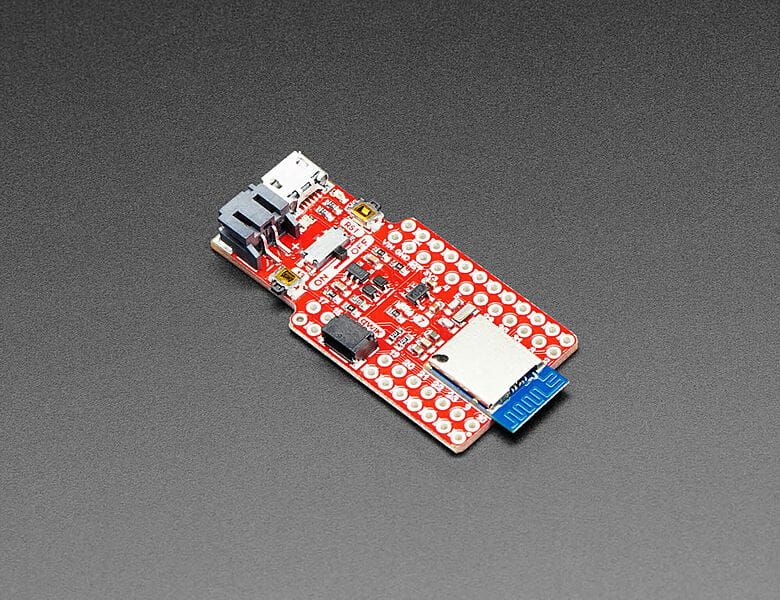
Pro nRF52840 Mini by SparkFun
The SparkFun Pro nRF52840 Mini is a breakout and development board for Nordic Semiconductor’s nRF52840 – a powerful combination of ARM Cortex-M4 CPU and 2.4GHz Bluetooth radio. With the nRF52840 at the heart of your project, you’ll be presented with a seemingly endless list of project-possibilities in an incredibly small package.
SparkFun’s mini development board for the nRF52840 breaks out most of the critical I/O pins including GPIO and those needed for power while maintaining a small footprint that nearly matches that of the Arduino Pro Mini (except those covered by the Qwiic Connector). It features a USB interface (using the nRF52840’s native USB support), which can be used to program, power, and communicate with the chip making it able to be used for any purpose (UART, I2C, SPI) that those of the Arduino Pro Mini could. The Pro nRF52840 Mini features a Raytac MDBT50Q-P1M module. This module connects the nRF52840 to a trace antenna, fits the IC into an FCC-approved footprint, and also includes a lot of the decoupling and timing mechanisms that would otherwise be required for a bare nRF52840 design. Also included onboard is a LiPo battery charger, a Qwiic connector, an on/off switch, a reset switch, and a user LED/button.
The board comes pre-programmed with a USB bootloader. You can develop programs for the nRF52840’s Cortex-M4 using either Arduino, CircuitPython, or C (using Nordic’s nRF5 SDK), and load that compiled code using a USB serial or mass-storage interface.
Purchase
Contribute
Have some info to add for this board? Edit the source for this page here.
CircuitPython 10.0.3
This is the latest stable release of CircuitPython that will work with the Pro nRF52840 Mini. Use this release if you are new to CircuitPython.
On nRF boards, CircuitPython 8.2.0 and later require UF2 bootloader version 0.6.1 or later. Older bootloaders cannot load the firmware. See Update UF2 Bootloader below.
Modules included in this download
_bleio _bleio (native) _pixelmap adafruit_bus_device adafruit_pixelbuf aesio alarm analogio array atexit audiobusio audiocore audiomixer audiomp3 audiopwmio binascii bitbangio bitmapfilter bitmaptools board builtins builtins.pow3 busdisplay busio busio.SPI busio.UART codeop collections countio digitalio displayio epaperdisplay errno fontio fourwire framebufferio getpass gifio i2cdisplaybus io jpegio json keypad keypad.KeyMatrix keypad.Keys keypad.ShiftRegisterKeys keypad_demux keypad_demux.DemuxKeyMatrix locale lvfontio math memorymap microcontroller msgpack neopixel_write nvm onewireio os os.getenv paralleldisplaybus pulseio pwmio rainbowio random re rgbmatrix rotaryio rtc sdcardio sharpdisplay storage struct supervisor synthio sys terminalio tilepalettemapper time touchio traceback ulab usb_cdc usb_hid usb_midi vectorio warnings watchdog zlibFeatures: Battery Charging, Bluetooth/BTLE, STEMMA QT/QWIIC
CircuitPython 10.1.0-rc.1
This is the latest development release of CircuitPython that will work with the Pro nRF52840 Mini.
Alpha development releases are early releases. They are unfinished, are likely to have bugs, and the features they provide may change. Beta releases may have some bugs and unfinished features, but should be suitable for many uses. A Release Candidate (rc) release is considered done and will become the next stable release, assuming no further issues are found.
Please try alpha, beta, and rc releases if you are able. Your testing is invaluable: it helps us uncover and find issues quickly.
On nRF boards, CircuitPython 8.2.0 and later require UF2 bootloader version 0.6.1 or later. Older bootloaders cannot load the firmware. See Update UF2 Bootloader below.
Modules included in this download
_bleio _bleio (native) _pixelmap adafruit_bus_device adafruit_pixelbuf aesio alarm analogio array atexit audiobusio audiocore audiomixer audiomp3 audiopwmio binascii bitbangio bitmapfilter bitmaptools board builtins builtins.pow3 busdisplay busio busio.SPI busio.UART codeop collections countio digitalio displayio epaperdisplay errno fontio fourwire framebufferio getpass gifio hashlib i2cdisplaybus io jpegio json keypad keypad.KeyMatrix keypad.Keys keypad.ShiftRegisterKeys keypad_demux keypad_demux.DemuxKeyMatrix locale lvfontio math memorymap microcontroller msgpack neopixel_write nvm onewireio os os.getenv paralleldisplaybus pulseio pwmio rainbowio random re rgbmatrix rotaryio rtc sdcardio sharpdisplay storage struct supervisor synthio sys terminalio tilepalettemapper time touchio traceback ulab usb_cdc usb_hid usb_midi vectorio warnings watchdog zlibFeatures: Battery Charging, Bluetooth/BTLE, STEMMA QT/QWIIC
Absolute Newest
Every time we commit new code to CircuitPython we automatically build binaries for each board and language. The binaries are stored on Amazon S3, organized by board, and then by language. These releases are even newer than the development release listed above. Try them if you want the absolute latest and are feeling daring or want to see if a problem has been fixed.
Previous Versions of CircuitPython
All previous releases of CircuitPython are available for download from Amazon S3 through the button below. For very old releases, look in the OLD/ folder for each board. Release notes for each release are available at GitHub button below.
Older releases are useful for testing if you something appears to be broken in a newer release but used to work, or if you have older code that depends on features only available in an older release. Otherwise we recommend using the latest stable release.
